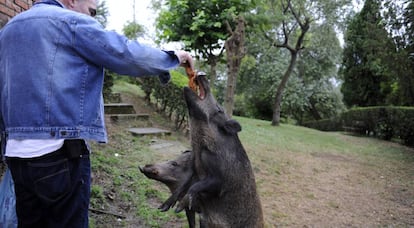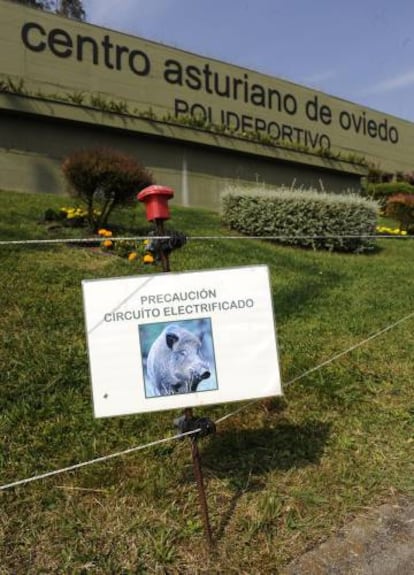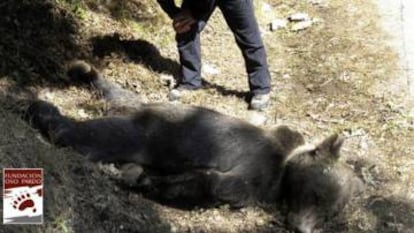Wild boars close in on Spanish city of Oviedo
Pigs are waging a guerrilla war in northern Spain, where some residents feed them despite warnings

It’s not the first thing you might expect to see while strolling in a Spanish city, but wild boars are becoming an increasingly common sight on the streets of Oviedo, the capital of Spain’s northern Asturias region.
In recent years, the animals have made a habit of plundering crops and ransacking orchards on the city’s fringes, taking refuge in the thick undergrowth that has sprouted up around abandoned farmsteads and in local woodlands where hunting is prohibited.
We’re going to have to pay €2,300 just for the most recent damage they did to some pastureland
Carlos Cuervo, head of hunting society
They have caused dozens of traffic accidents and the regional rural development department says Asturias spends €500,000 a year repairing damage caused by the hooved animals.
Now, the wild boars are coming down from the hills and into town in search of food. Local police in Oviedo have registered more than 20 incursions by the animals into the city’s residential areas in 2016.
Not everyone is unhappy about the presence of the animal though, with some locals even feeding them.
“What are you supposed to do with leftover food? Throw it away? I prefer to give it to the little pigs,” one resident says.

Before long a huddle of residents has gathered in support of the swine, describing the visitors as “good-natured” and “defenseless”. To prove the point, one member of the group calls to the pigs, who wander over with all the calm of animals accustomed to contact with humans.
“These animals are the great survivors,” explains John J. Mayer of the Savannah River National Laboratory in the United States, who has been studying the species for more than four decades. “With an adequate supply of food, water, shade and cover under which to escape, they can live almost anywhere,” says this expert in zoology.
This is the case in Oviedo, where the boars have learned to live – as Mao Zedong said of the Red Army – like a fish in water, even posing for videos and photos or taking food from people’s hands and letting their bellies be stroked like dogs.
But Carlos Nores, a doctor of biology at Oviedo University, warns that these are wild animals which can “react in a highly aggressive manner when they feel threatened or when protecting their young.”
Carlos Cuervo, who runs the society that manages the hunting zone closest to Oviedo, says they will come up short this year when it comes to their budget for repairing damage by wild boars.
Bear killed in nature reserve

Asturias is something of an environmental battleground, with hunters and environmentalists facing off over the fate of wild animals. On Saturday, a brown bear weighing 105 kilograms was found dead in the region’s Muniellos Nature Reserve. Investigators determined it had been shot.
The environmental group FAPAS said the death of the bear was connected with wild boar hunts which began recently in the Somiedo Natural Park in Asturias. The group said the hunting of wild boars in the area signified a “critical risk” for efforts to protect the brown bear.
The species of brown bear that lives in northern Spain is classified as an endangered animal in danger of extinction.
“We’re going to have to pay €2,300 just for the most recent damage they did to some pastureland,” he says.
The road that divides this hunting zone just north of the city from those woodlands where hunting is prohibited is littered with abandoned farms whose fruit trees provide rich pickings for the animals. On these properties, the pigs lay in wait before ambushing unsuspecting drivers and carrying out raids on crops.
Adding to the problem is Asturias’ dramatic population decline. Fully 86 municipalities in the region can’t even boast a single resident while 300 others have a population of fewer than 10, according to Spain’s national statistics agency, the INE.
This stark situation has paved the way for a rise in wild boar numbers, according to Nores, who explains that the animals breed like rodents.
Hunters say they have killed 217 wild boars in five months in the Monte Naranco area near Oviedo, but their numbers keeps rising.
Ricardo Fernández, the Socialist councilor for public safety in the city, has proposed sterilization as a possible solution to the problem, but admits there are drawbacks to that idea. “New options like contraceptives and poisons that target pigs are being developed but won’t be available for widespread use in the short term,” he says.
Back on the streets of Oviedo, one resident who, in a bid to protect the boars, refuses to give his name or even that of his suburb, gestures to the animals and says: “Look how sweet they are”.
The animals trot up to him, lift their snouts and eat out of his hand. They know that as long as they move like fish in water they are safe, even behind enemy lines, as Mao Zedong taught.
English version by George Mills.
Tu suscripción se está usando en otro dispositivo
¿Quieres añadir otro usuario a tu suscripción?
Si continúas leyendo en este dispositivo, no se podrá leer en el otro.
FlechaTu suscripción se está usando en otro dispositivo y solo puedes acceder a EL PAÍS desde un dispositivo a la vez.
Si quieres compartir tu cuenta, cambia tu suscripción a la modalidad Premium, así podrás añadir otro usuario. Cada uno accederá con su propia cuenta de email, lo que os permitirá personalizar vuestra experiencia en EL PAÍS.
¿Tienes una suscripción de empresa? Accede aquí para contratar más cuentas.
En el caso de no saber quién está usando tu cuenta, te recomendamos cambiar tu contraseña aquí.
Si decides continuar compartiendo tu cuenta, este mensaje se mostrará en tu dispositivo y en el de la otra persona que está usando tu cuenta de forma indefinida, afectando a tu experiencia de lectura. Puedes consultar aquí los términos y condiciones de la suscripción digital.








































